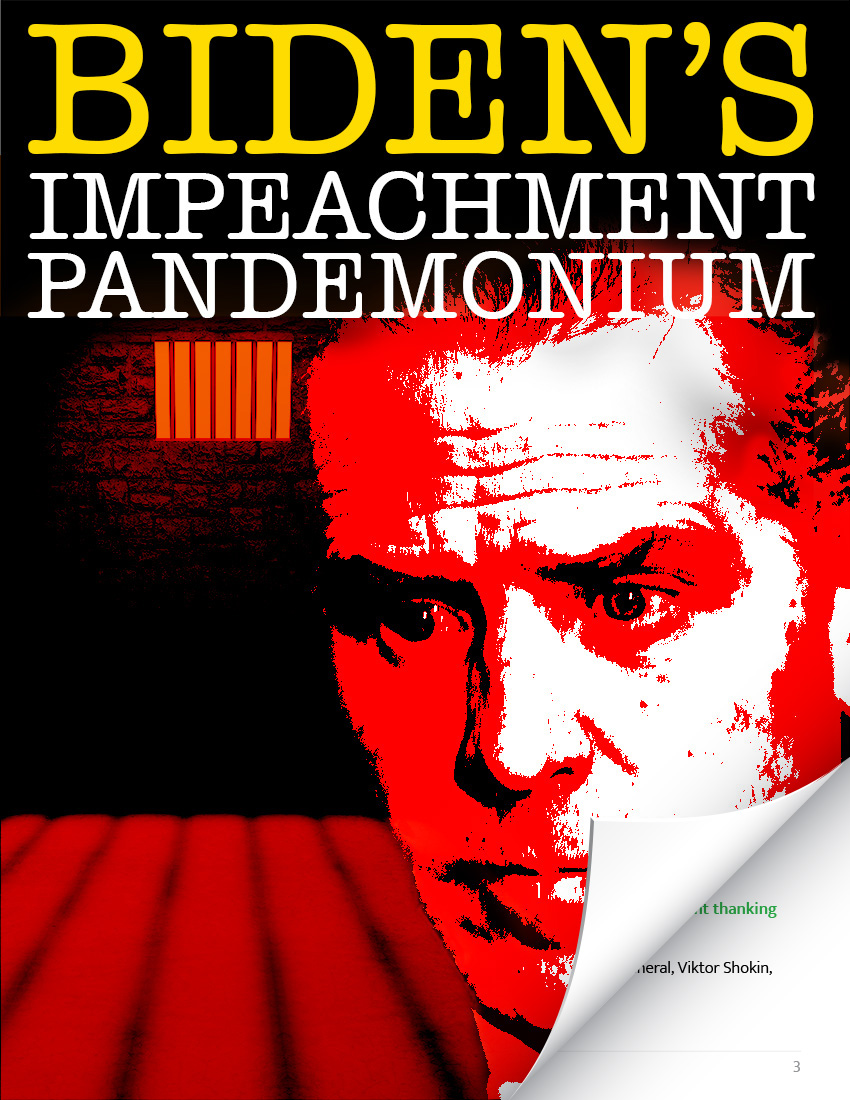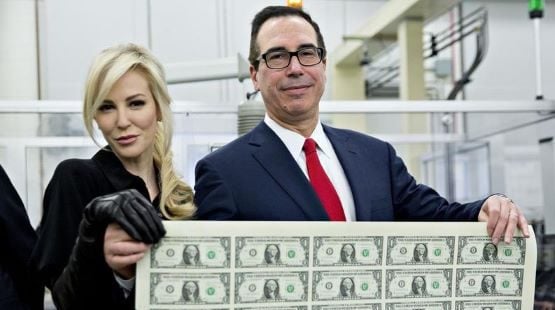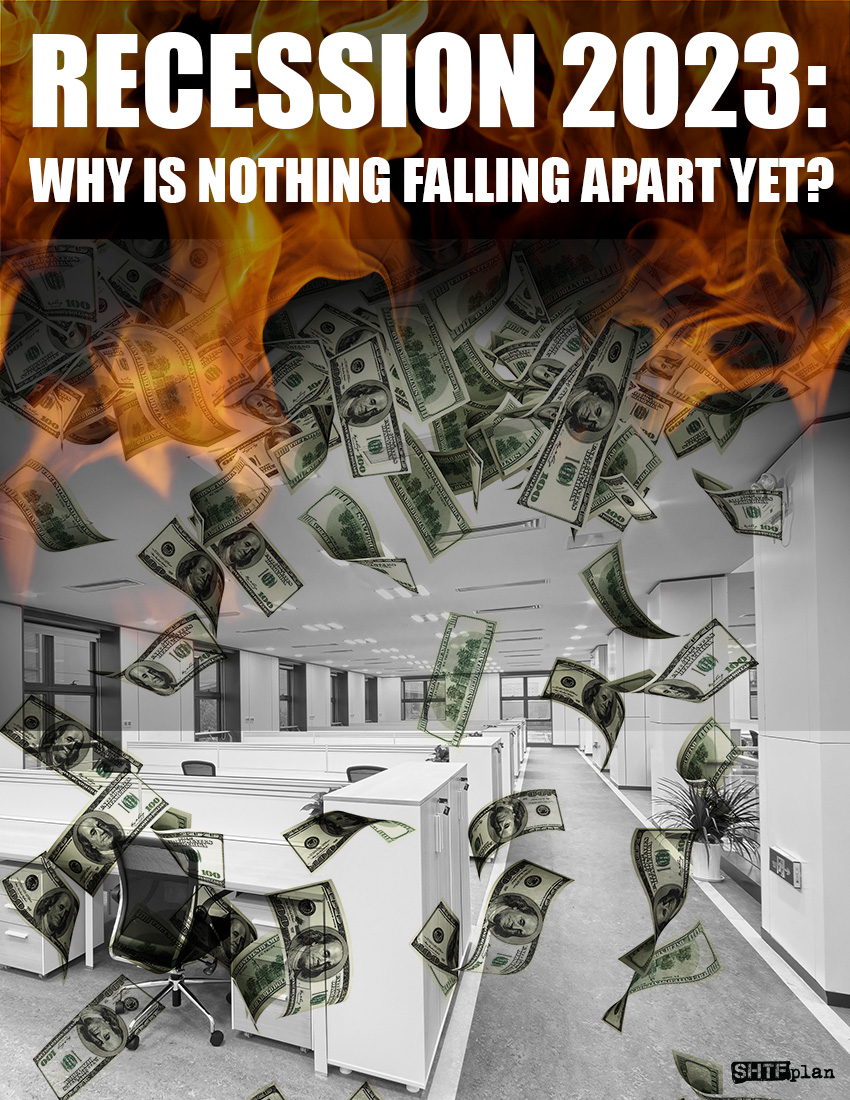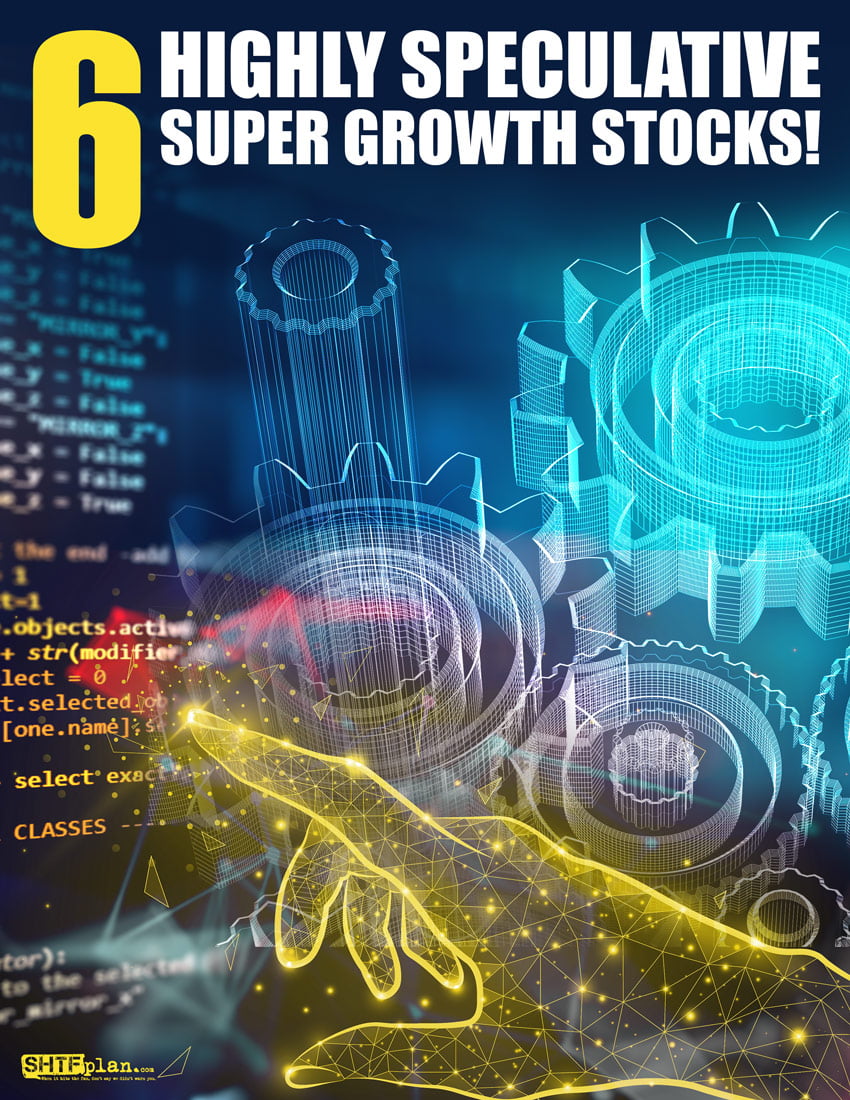
TRUMP SAYS: HUNTER MAKES FORTUNE FROM SHADY DEALS!
BIDEN FAMILY STINKS TO HIGH HEAVENS OF CORRUPTION!
DON'T GET LEFT OUT: HUNTER MUST BE STOPPED!

This article was originally published by Hans-Hermann Hoppe at The Mises Institute on October 13, 2011.

Imagine you are in command of the state, defined as an institution that possesses a territorial monopoly of ultimate decision making in every case of conflict, including conflicts involving the state and its agents itself, and, by implication, the right to tax, i.e., to unilaterally determine the price that your subjects must pay you to perform the task of ultimate decision making.
To act under these constraints — or rather, lack of constraints — is what constitutes politics and political action, and it should be clear from the outset that politics, then, by its very nature, always means mischief. Not from your point of view, of course, but mischief from the point of view of those subject to your rule as the ultimate judge. Predictably, you will use your position to enrich yourself at other people’s expense.
More specifically, we can predict in particular what your attitude and policy vis-à-vis money and banking will be.
Assume that you rule over a territory that has developed beyond the stage of a primitive barter economy and where a common medium of exchange, i.e., money, is in use. First off, it is easy to see why you would be particularly interested in money and monetary affairs. As a state ruler, you can in principle confiscate whatever you want and provide yourself with an unearned income. But rather than confiscating various producer or consumer goods, you will naturally prefer to confiscate money. Because money, as the most easily and widely saleable and acceptable good of all, allows you the greatest freedom to spend your income as you like, on the greatest variety of goods. First and foremost, then, the taxes you impose on society will be money taxes, whether on property or income. You will want to maximize your money-tax revenues.
In this attempt, however, you will quickly encounter some rather intractable difficulties. Eventually, your attempts to further increase your tax income will encounter resistance in that higher tax rates will not lead to higher but to lower tax revenue. Your income — your spending money — declines, because producers, burdened with increasingly higher tax rates, simply produce less.
In this situation, you only have one other option to further increase or at least maintain your current level of spending: by borrowing such funds. And for that you must go to banks — and hence your special interest also in banks and the banking industry. If you borrow money from banks, these banks will automatically take an active interest in your future well-being. They will want you to stay in business, i.e., they want the state to go on in its exploitation business. And since banks tend to be major players in society, such support is certainly beneficial to you. On the other hand, as a negative, if you borrow money from banks you are not only expected to pay your loan back but to pay interest on top.
The question, then, that arises for you as the ruler is, How can I free myself of these two constraints, i.e., of tax-resistance in the form of falling tax revenue and of the need to borrow from and pay interest to banks?
It is not too difficult to see what the ultimate solution to your problem is.
You can reach the desired independence of taxpayers and tax payments and of banks, if only you establish yourself first as a territorial monopolist of the production of money. On your territory, only you are permitted to produce money. But that is not sufficient. Because as long as money is a regular good that must be expensively produced, there is nothing in it for you except expenses. More importantly, then, you must use your monopoly position in order to lower the production cost and the quality of money as close as possible to zero. Instead of costly quality money such as gold or silver, you must see to it that worthless pieces of paper that can be produced at practically zero cost will become money. (Normally, no one would accept worthless pieces of paper as payment for anything. Pieces of paper are acceptable as payment only insofar as they are titles to something else, i.e., property titles. In other words, then, you must replace pieces of paper that were titles to money with pieces of paper that are titles to nothing.)
Under competitive conditions, i.e., if everyone were free to produce money, a money that can be produced at almost zero cost would be produced up to a quantity where marginal revenue equals marginal cost, and because marginal cost is zero the marginal revenue, i.e., the purchasing power of this money would be zero as well. Hence, the necessity to monopolize the production of paper money, so as to restrict its supply, in order to avoid hyperinflationary conditions and the disappearance of money from the market altogether (and a flight into “real values”) — and the more so the cheaper the money commodity.
In a way, you have thus accomplished what all alchemists and their sponsors wanted to achieve: you have produced something valuable (money with purchasing power) out of something practically worthless. What an achievement. It costs you practically nothing and you can turn around and buy yourself something really valuable, such as a house or a Mercedes; and you can achieve these wonders not just for yourself but also for your friends and acquaintances, of which you discover that you have all of a sudden far more than you used to have (including many economists, who explain why your monopoly is really good for everyone).
What are the effects? First and foremost, more paper money does not in the slightest affect the quantity or quality of all other, nonmonetary goods. There exist just as many other goods around as before. This immediately refutes the notion — apparently held by most if not all mainstream economists — that “more” money can somehow increase “social wealth.” To believe this, as everyone proposing a so-called easy-money policy as an efficient and “socially responsible” way out of economic troubles apparently does, is to believe in magic: that stones — or rather paper — can be turned into bread.
Rather, what the additional money you printed will affect is twofold. On the one hand, money prices will be higher than they would otherwise be, and the purchasing power per unit of money will be lower. In a word, the result will be inflation. More importantly, however, all the while the greater amount of money does not increase (or decrease) the total amount of presently existing social wealth (the total quantity of all goods in society), it redistributes the existing wealth in favor of you and your friends and acquaintances, i.e., those who get your money first. You and your friends are relatively enriched (own a larger part of the total social wealth) at the expense of impoverishing others (who as a result own less).
The problem, for you and your friends, with this institutional setup is not that it doesn’t work. It works perfectly, always to your own (and your friends’) advantage and always at the expense of others. All you have to do is to avoid hyperinflation. For in that case people would avoid using money and flee into real values, thus robbing you of your magic wand. The problem with your paper-money monopoly, if there is one at all, is only that this fact will be immediately noticed also by others and recognized as the big, criminal rip-off that it indeed is.
But this problem can be overcome, too, if, in addition to monopolizing the production of money, you also set yourself up as a banker and enter the banking business with the establishment of a central bank.
Because you can create paper money out of thin air, you can also create credit out of thin air. In fact, because you can create credit out of nothing (without any savings on your part), you can offer loans at cheaper rates than anyone else, even at an interest rate as low as zero (or even at a negative rate). With this ability, not only is your former dependency on banks and the banking industry eliminated; you can, moreover, make banks dependent on you, and you can forge a permanent alliance and complicity between banks and state. You don’t even have to become involved in the business of investing the credit yourself. That task, and the risk involved in it, you can safely leave to commercial banks. What you, your central bank, need to do is only this: You create credit out of thin air and then loan this money, at below-market interest rates, to commercial banks. Instead of you paying interest to banks, banks now pay interest to you. And the banks in turn loan out your newly created easy credit to their business friends at somewhat higher but still submarket interest rates (to earn from the interest differential). In addition, to make the banks especially keen on working with you, you may permit the banks to create a certain amount of their own new credit (of checkbook money) in addition and on top of the credit that you have created (fractional-reserve banking).
What are the consequences of this monetary policy? To a large extent, they are the same as with an easy money policy: First, an easy credit policy is also inflationary. More money is brought into circulation and prices will be higher, and the purchasing power of money lower, than would have been the case otherwise. Second, the credit expansion too has no effect on the quantity or quality of all goods currently in existence. It neither increases nor decreases their amount. More money is just this: more paper. It does not and cannot increase social wealth by one iota. Third, easy credit also engenders a systematic redistribution of social wealth in favor of you, the central bank, and the commercial banks within your cartel. You receive an interest return on money that you have created at practically zero cost out of thin air (instead of on money costly saved out of an existing income), and so do the banks, who earn additional interest on your costless money loans. Both you and your banker friends thereby appropriate an “unearned income.” You and the banks are enriched at the expense of all “real” money savers (who receive a lower interest return than they otherwise would, i.e., without the injection of your and the banks’ cheap credit into the credit market).
On the other hand, there also exists a fundamental difference between an easy, print-and-spend money policy and an easy, print-and-loan credit policy.
First off, an easy credit policy alters the production structure — what is produced and by whom — in a highly significant way.
You, the chief of the central bank, can create credit out of thin air. You do not have to first save money out of your money income, i.e., cut your own expenses, and thus abstain from buying certain nonmoney goods (as every normal person must if he extends credit to someone). You only have to turn on the printing press and can thus undercut any interest rate demanded of borrowers by savers elsewhere in the market. Granting credit does not involve any sacrifice on your part (which is why this institution is so “nice”). If things then go well, you will be paid a positive-interest return on your paper investment, and if they don’t go well — well, as the monopoly producer of money, you can always make up losses more easily than anyone else: by covering your losses with even more printed paper.
Without costs and no genuine, personal risk of losses, then, you can grant credit essentially indiscriminately, to everyone and for any purpose, without concern for the creditworthiness of the debtor or the soundness of his business plan. Because of your “easy” credit, certain people (in particular investment bankers) who otherwise would not be deemed sufficiently creditworthy, and certain projects (in particular of banks and their main clients) that would not be considered profitable but wasteful or too risky instead do get credit and do get funded.
Essentially, the same applies to the commercial banks within your banking cartel. Because of their special relationship to you, as the first recipients of your costless low-interest paper-money credit, the banks, too, can offer loans to prospective lenders at interest rates below-market interest rates — and if things go well for them they go well; and if they don’t, they can rely on you, as the monopolistic producer of money, to bail them out in the same way as you bail yourself out of any financial trouble: by more paper money. Accordingly, the banks too will be less discriminating in the selection of their clients and their business plans and more prone to funding the “wrong” people and the “wrong” projects.
And there is a second significant difference between a print-and-spend and a print-and-loan policy and this difference explains why the income and wealth redistribution in your and your banker friends’ favor that is set in motion by easy credit takes the specific form of a temporal — boom-bust — cycle, i.e., of an initial phase of seeming general prosperity (of expected increases in future incomes and wealth) followed by a phase of widespread impoverishment (when the prosperity of the boom period is revealed as a widespread illusion).
This boom-bust feature is the logical — and physically necessary — consequence of credit created out of thin air, of credit unbacked by savings, of fiduciary credit (or however else you may call it), and of the fact that every investment takes time and only shows later on, at some time in the future, whether it is successful or not.
The reason for the business cycle is as elementary as it is fundamental. Robinson Crusoe can give a loan of fish (which he has not consumed) to Friday. Friday can convert these savings into a fishing net (he can eat the fish while constructing the net), and with the help of the net, then, Friday, in principle, is capable of repaying his loan to Robinson, plus interest, and still earn a profit of additional fish for himself. But this is physically impossible if Robinson’s loan is only a paper note, denominated in fish, but unbacked by real-fish savings, i.e., if Robinson has no fish because he has consumed them all.
Then, and necessarily so, Friday must fail in his investment endeavor. In a simple barter economy, of course, this becomes immediately apparent. Friday will not accept Robinson’s paper credit in the first place (but only real, commodity credit), and because of this, the boom-bust cycle will not get started. But in a complex monetary economy, the fact that credit was created out of thin air is not noticeable: every credit note looks like any other, and because of this the notes are accepted by the takers of credit.
This does not change the fundamental fact of reality that nothing can be produced out of nothing and that investment projects undertaken without any real funding whatsoever (by savings) must fail, but it explains why a boom — an increased level of investment accompanied by the expectation of higher future income and wealth — can get started (Friday does accept the note instead of immediately refusing it). And it explains why it then takes a while until the physical reality reasserts itself and reveals such expectations as illusory.
But what’s a little crisis to you? Even if your path to riches is through repeated crises, brought about by your paper-money regime and central-bank policies, from your point of view — from the viewpoint as the head of state and chief of the central bank — this form of print-and-loan wealth redistribution in your own and your banker friends’ favor, while less immediate than that achieved with a simple print-and-spend policy, is still much preferable, because it is far more difficult to see through and recognize for what it is. Rather than coming across as a plain fraud and parasite, in pursuing an easy-credit policy you can even pretend that you are engaged in the selfless task of “investing in the future” (rather than spending on present frivolities) and “healing” economic crises (rather than causing them).
What a world we live in!

It Took 22 Years to Get to This Point
This article was originally published by Michael Snyder at The Economic Collapse Blog. When one...
This article was originally published by Lance D. Johnson at Natural News under the title:...
The mainstream media has started reporting that the bird flu "luck" has "run out" for the United...
Commenting Policy:
Some comments on this web site are automatically moderated through our Spam protection systems. Please be patient if your comment isn’t immediately available. We’re not trying to censor you, the system just wants to make sure you’re not a robot posting random spam.
This website thrives because of its community. While we support lively debates and understand that people get excited, frustrated or angry at times, we ask that the conversation remain civil. Racism, to include any religious affiliation, will not be tolerated on this site, including the disparagement of people in the comments section.


A lot of us are going to be millionaires…
YOUTUBE Be Coming Human by John Trudell
ITS real simple – Money makes the WORLD go round!
The Fed is not the government; they are private banks.
So make up your mind who the enemy is.
The banksters own the government, but government constitutionally rightly belongs to The People via democratic processes.
…make up your mind who the enemy is.
At this point, they both are.
When the government allows the the banks to set presidence and laws, then it’s time to revoke both.
The rest, is up to all of us.
Bitch and moan? or Take action?
Decisions, decisions, decisions…
In talking with a brother in Christ today, he was talking about the cost of silver and gold…I told him my wealth is not of this world for I am a heir with Christ as Christ owns everything and one day when He returns I will be given my inheritance.
Yet while I am on this earth and face every day tribulations as Jesus spoke in the gospel according to John. I set my earthly eyes on three categories….the Three B’s
Bullets
Beans
Band aids
If I can’t shoot it, eat it or drink it I have no use for it…yes I need money to buy those things, yet money is not my main focus…for you can have all the gold when SHTF and you will starve and yet on the other hand I will survive and when you die I will mosey on over and take your gold and silver out of your dead hands..
So I ask, where is your treasure….? I’ll leave you with the words of the Lord Jesus Christ…
Matthew 6:19-21
New American Standard Bible 1995
19 “Do not store up for yourselves treasures on earth, where moth and rust destroy, and where thieves break in and steal. 20 But store up for yourselves treasures in heaven, where neither moth nor rust destroys, and where thieves do not break in or steal; 21 for where your treasure is, there your heart will be also.
Now of course this true only if you have been redeemed by the Blood of the Lamb and covered with His righteousness…otherwise it is a different outcome for you…
Revelation 20:11-15
New American Standard Bible 1995
Judgment at the Throne of God
11 Then I saw a great white throne and Him who sat upon it, from whose [a]presence earth and heaven fled away, and no place was found for them. 12 And I saw the dead, the great and the small, standing before the throne, and [b]books were opened; and another [c]book was opened, which is the book of life; and the dead were judged from the things which were written in the [d]books, according to their deeds. 13 And the sea gave up the dead which were in it, and death and Hades gave up the dead which were in them; and they were judged, every one of them according to their deeds. 14 Then death and Hades were thrown into the lake of fire. This is the second death, the lake of fire. 15 And if [e]anyone’s name was not found written in the book of life, he was thrown into the lake of fire.
So you can bow the knee now and call upon the Lord Jesus and be saved or you can bow the knee at the end and be cast in the lake of fire, for all will bow the knee and confess Jesus as Lord, yet for those at the end will be sent to eternal suffering and those who confess before that day will go to glory…which will it be?
There is no longer such a thing as “fractional reserve banking”.
For one thing, in 2020, the Federal Reserve eliminated the reserve requirement for all banks.
Also, in 2014, the grand daddy of central banks (going back to the 1640s), the Bank of England, released a white paper that explained the creation of money/credit. They explained how money is created at the point of the loan and credited to your account. No reserves or other people’s deposits are used…it is conjured up out of thin air…all of it. This is why banks don’t care that you hold interest bearing accounts with them. They don’t want them because interest bearing accounts are an expense.
This is what makes government borrowing money and spending it into the general economy a good thing, without it we wouldn’t have any money.
It also increases tax revenues since the amount of money being taxed increases accordingly.
A win win situation, everybody comes out ahead.
Serfs that paid tribute to the King of the Castle were no worse off than TAXPAYERS in the modern USA. Whereas serfs had no illusion of INDIVIDUAL RIGHTS, modern taxpayers in the USA know that the Bill of Rights no longer means anything to the modern King of the Castle (mayors,governors, congress-critters, etc.). Sure, there are some exceptions like Ted Cruz, Rand Paul, Jim Jordan, even Joe Manchin, but these are exceptions to the rule.